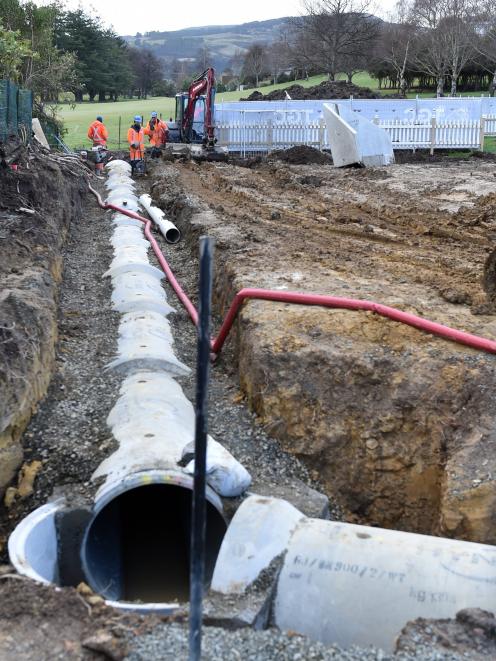
The big problem with water is that no-one owns it, despite claims by Maoridom that freshwater belongs to them.
Labour’s Nanaia Mahuta’s rather bare-faced attempt to reconfigure water administration with claims of a singular Maori historical and cultural interest in water was a bit of jiggery-pokery.
That would have resulted in a direct levy or charge for freshwater imposed on all industrial and domestic users and going solely to Maori.
To the very best of my knowledge, pipes, dams and water races did not exist pre-European times so claims to actual ownership are demonstrably wrong. Today, only hydro dams have special legislation protecting their interests in water and infrastructure.
This issue is not so much who owns water but who has the use rights to freshwater along with what to do with sewage and wastewater especially .
This issue is a massive unknown within local government which, in itself, is already badly broken.
Cast your mind back to the trigger for this water debacle.

An unsealed bore in Havelock North allowed polluted run-off to enter the groundwater used for town water supply. Four people died as a result.
No other deaths have occurred due to poor water quality from any other town water supply anywhere in New Zealand. A simple concrete collar around the intake would have diverted the polluted water away and in turn also diverted the need for billions of dollars to be spent nationally.
Have readers noticed that "burst pipes" rarely occur locally yet are commonplace in the North Island, especially Wellington? Why is that?
As a former farmer with a private water scheme under high pressure, I soon noticed that leaks occurred due to contraction and expansion of the pipe. Leaks always occurred at the join.
No rocket science involved here. The actual pipes themselves rarely leak.
A chance encounter with a couple of plumbers recently confirmed my suspicions — the workmanship at the join was usually the major cause of the leaks. The pipes themselves are usually fine unless they are made of asbestos, galvanised iron, or lead, which clearly do need replacing.
The problem is the politicisation of water by those with a vested interest and the lack of experienced oversight.
Readers may recall a real problem with water and drainage of the Carisbrook ground quite some years ago.
In desperation, the ground management called in a couple of Southland blokes who had drained properties into productive enterprises. Along with unqualified cockies, they turned Carisbrook into a wonderful playing surface.
What happens today? We call in "experts" who have rarely drained a bath, let alone laid a pipe. So why should we be surprised that problems exist in Wellington but not in Dunedin’s hill suburbs?
At a council meeting in Cromwell a few weeks ago, a question was asked of Mayor Cadogan: "What's the rush with this Three Waters stuff Tim?".
No reply was forthcoming, but the question is entirely valid. Why the indecent haste that is driving our councils into completely unnecessary debt at a time when affordability of rates is increasing at an alarming rate?
So, what would happen if the councils said "no, sorry minister, we can’t do this to our ratepayers, but we will improve and prioritise our Three Waters as finances allow"?
It is what all councils should have been doing forever.
The straightforward solution for better water is for the government to make available, say, $1 billion a year for replacement pipe work but with local government fixing all their own leaks.
A single South Island agency should manage all applications and prioritise funding, with a strong audit process of expenditure done regionally.
Oh, and appoint a couple of Southland farmers as advisers.
Now comes part two of the water saga.
It appears that neither the district council nor the regional council is co-ordinating plans about how to manage this issue. We have local councils trying to manage the same issue, with two sets of expenses being laid at the feet of the same ratepayer.
So how does that work for anybody?
Discharge of treated sewage to land is beyond the capacity of ratepayers to fund. The question of whose land is going to be available to discharge effluent to the point of runoff and how will neighbours be affected along with their land values is unknown.
Imagine giving directions to a visitor to your property: "turn left where the smell is strongest, then follow the soggy paper trail for the next kilometre".
Unless and until technology is available to turn sewage into a useful product and available to safely use on land, then discharge to land can’t occur despite the inherent problem with discharge to rivers.
It is an issue that Maori have rightly identified as being offensive but then, so too does everyone else.
If we want new hospitals and schools — in fact, all public goods — we need to reprioritise council spending.
A use right given for power generation cannot be reclaimed. Nor should all other uses once allocated. That incentivises investment.
Freshwater and storage deserves to be treated as the most valued and valuable entity. The giver of life to where there was once none.
An old French proverb notes "you only know the worth of water when the well is dry".
— Gerrard Eckhoff is a former Otago regional councillor and Act New Zealand MP. Our usual Thursday columnist, Hilary Calvert, is on leave.











